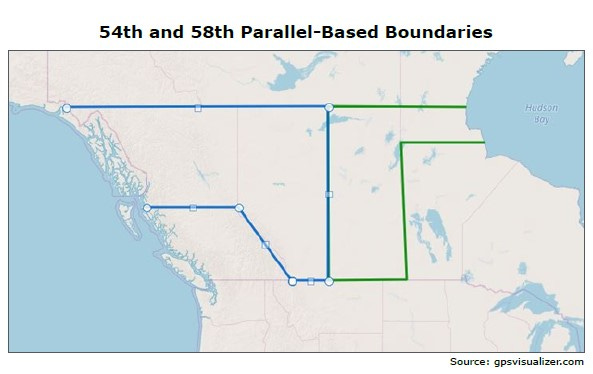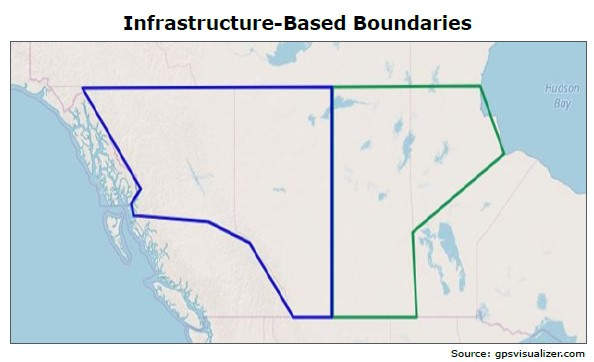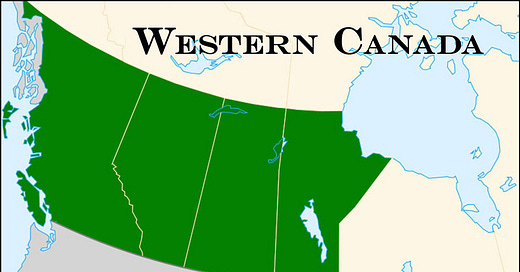Northern BC residents favour joining Alberta, reader survey finds
Two-thirds of respondents disagree with Premier Eby
When Vancouver-Quilchena MLA Dallas Brodie stood up in the legislature on May 1st and asked Premier David Eby if he would engage in meaningful consultation with British Columbians anxious about the future of the province and country, she didn’t really get an answer.
A week later, in a press conference, a reporter asked Eby about Canadian unity. Eby’s answer? “The idea of separating here is a non-starter.”
Yet The Broken Typewriter’s reader poll shows that more than two-thirds of respondents, 66 percent, disagree with the premier.
He implied that the only reason for growing separation sentiment in Alberta and Saskatchewan is because the premiers’ “preferred candidate was not successful in the Federal election,” and urged them to “push back strongly on any kind of separatist sentiment.”
Eby seems to think that this is a new concern, one that arose out of the election, not something that has been building for decades, since Pierre Elliot Trudeau was prime minister, if not longer. For fifty years, the West has felt disrespected, overlooked and taken advantage of by the government in Ottawa.
There’s a reason for the birth of both the Reform Party of BC and the Reform Party of Canada in the 1980s. Just as there’s a reason for the conservative surge on the provincial and federal political stage.
Something needs to change.
What David Eby also doesn’t seem to understand, even though his government has been told numerous times over the past few years, is that he is at fault too. Vancouver and Victoria’s attitude towards the northern reaches of British Columbia is eerily similar to Ottawa’s towards the West. Good for filling the government coffers, but otherwise, who cares what we need, want or deserve?
Brodie, in her question in the Legislature, said that according to recent polls, in the last year the number of British Columbians who want to leave Canada has grown from 20 to 28 percent.
But again, Eby refuses to discuss the matter, refuses to engage with British Columbians who feel left out, ignored and unrepresented in government.
Reform Party founder Preston Manning, in his recent article – Canada is in a unity crisis. A Canada West Assembly would investigate why – talked about the need for Ottawa to “recognize and accommodate the regional character of this country.” He advocates the creation of a Canada West Assembly, to help pinpoint and remove those things that are fracturing the country.
Things such as the treatment of the natural resources sector, which many business leaders, industry leaders, and politicians have acknowledged as key to building a strong economy. Something Prime Minister Mark Carney, and Premier Eby have professed to want.
Another thing is federal intrusion into provincial jurisdiction, such as natural resources, and health.
Interestingly, the lack of recognition of regional differences, as well as jurisdictional overreach, is something our esteemed NDP premier has in common with the federal Liberals.
Not only has the NDP government painted the entire province with the same brush, regardless of regional differences and needs for years – I’m sure Fort St. John city council, the Peace River Regional District board will agree with me on this – but in the last couple of years, Eby has stepped up his interference in municipal and regional matters.
First with the Housing Statutes Amendment Act and the subsequent ban on public hearings for zoning changes required to meet the requirements of the Act.
Then this month, claiming to need additional powers to streamline the economy in the face of the “threat” from US President Donald Trump and his tariffs, Eby brought out Bill 15, the Infrastructure Projects Act. This Act would give the provincial government the power to override municipalities to supposedly speed up infrastructure projects, and without oversight of the legislature.
The powers are similar to those removed from last month’s Bill 7, which also sought to allow the government to make decisions without the oversight of the legislature.
Yet Eby maintains that there’s no cause for a discussion on separation.
After my poll was launched last week – and thank-you to all who responded, both by taking the poll and by commenting on Facebook – I learned that in 2019, Gerard Lucyshyn of the Frontier Centre for Public Policy, wrote a paper called Tide-Water Access: Redefining Canada’s Internal Boundaries, which examined the possibility of redrawing provincial borders to add Northern BC to Alberta.
The current boundaries, according to Lucyshyn “were developed largely from the administrative organization of the Hudson’s Bay Company and its relationship with the Government of Canada.”
They were also drawn without taking regional characteristics, economies or communities into consideration. An example is the fact that the line between BC and Alberta cuts Treaty 8 territory in half.
While this paper examined how to give land-locked provinces such as Alberta access to tidewater, given the similarities in geography, economy and culture between Alberta and northern British Columbia, such a division could satisfy some of the regional political and economic angst felt by residents of this part of the province.
Which brings us to the rest of the results of the survey.
Of the 66 percent of respondents who disagreed with David Eby’s assertion that the possibility British Columbia independence is a non-starter, 51 percent would like to see a referendum for north of Prince George separation; 28 percent for northeastern BC only separation; and 21 percent were for province-wide separation.
However, an overwhelming 71 percent of respondents said that BC, north of Prince George should join Alberta.
Based on Lucyshyn’s 2019 paper, that could look one of two ways:


Using the 54th parallel as a boundary, would cut Vanderhoof (54.01°) in half and likely Prince George (53.9°) as well, creating more angst with communities straddling a new provincial border.
The other option Lucyshyn proposed uses infrastructure, specifically Highway 16, as the boundary with all lands on the south side of the highway remaining in BC, and the land on the north side joining Alberta.
Neither of these sounds like an ideal solution. Communities could be adversely affected. Yes, Lloydminster straddles the Alberta-Saskatchewan border, but deliberately causing such a situation seems unfair.
Clearly, if any kind of separation from British Columbia is even to be considered, whoever is going to make it happen must do better than the current government and take the wishes of the communities into consideration, rather than drawing an ill-considered line across the province.
But first, all options should be examined, including putting the question to a referendum. If The Broken Typewriter’s poll is indeed a snapshot of sentiment in the region, 70 percent of Northern BC residents want out of BC. Whether that means joining Alberta – the preferred option according to my survey – or out of Canada altogether, remains to be seen.
In the meantime, Preston Manning’s idea of a Canada West Assembly sounds like a good place to start, in terms of working to keep the nation together.
Provincially, Eby should put his money where his mouth is – if he really believes that BC is “all in for Canada”, and that we could be a powerhouse economically, he needs to stop trying to give himself sweeping powers that likely won’t reduce the red tape hampering economic development. He needs to listen to ALL British Columbians, taking regional differences into account and accept that municipalities, regional districts and First Nations know what their residents want and need better than Eby.
The Ronald Reagan quote from my January editorial comes to mind, as a reminder for Premier David Eby:
“There’s very little government can do as efficiently and economically as people can do themselves.”



